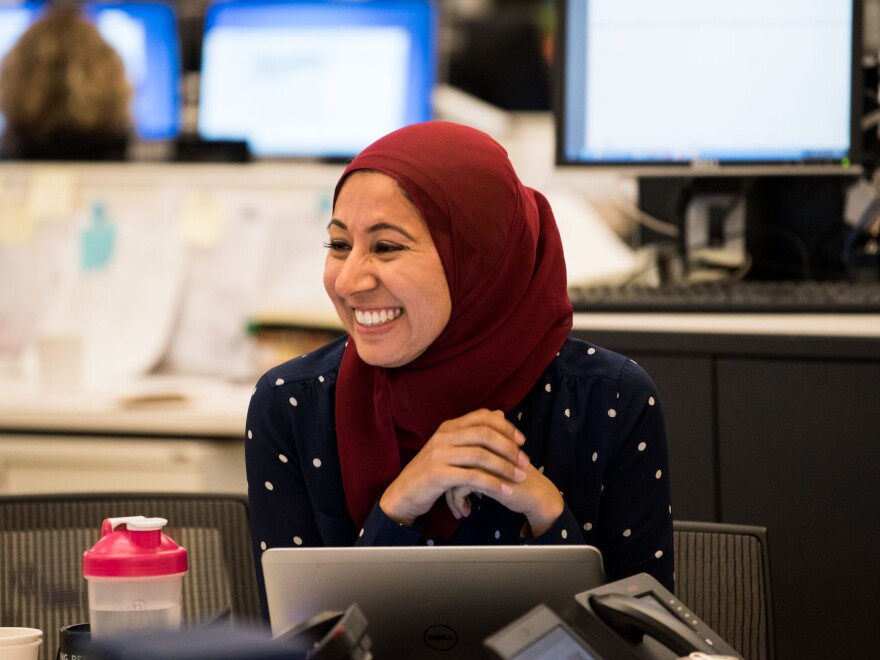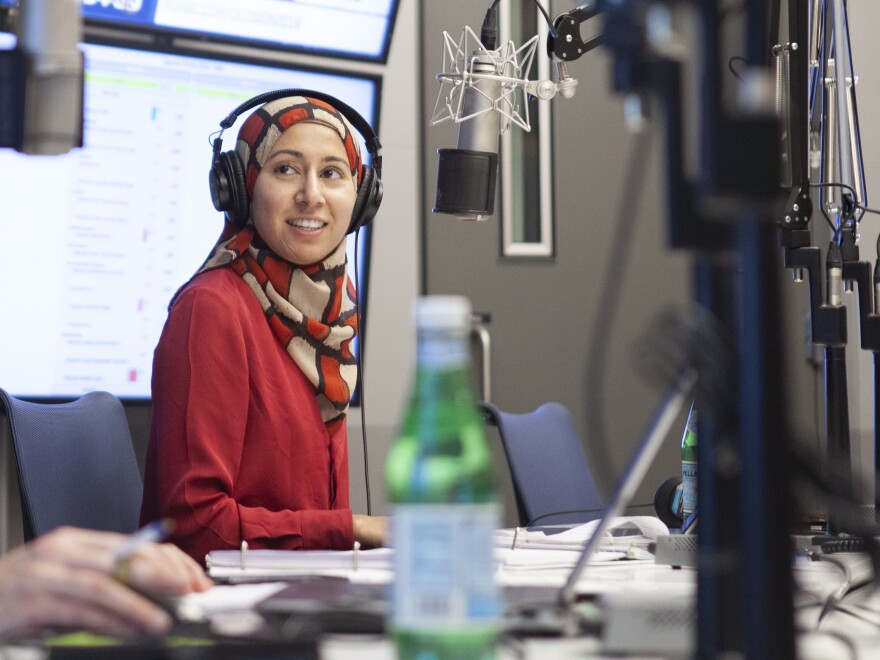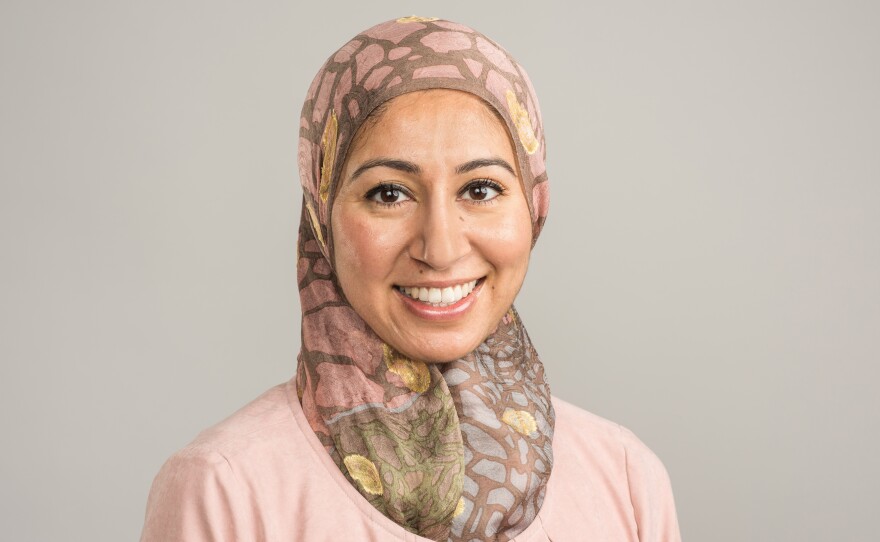Faces Of NPR showcases the people behind NPR--from the voices you hear every day on the radio to the ones who work outside of the recording studio. You'll find out about what they do and what they're inspired by on the daily. This month, we feature NPR's Asian American and Pacific Islander community. Next up is Asma Khalid
The Basics:
Name: Asma Khalid
Where you're from: Crown Point, Indiana
Title: White House Correspondent
Handle: @asmamk
You have covered many political campaigns for NPR. What kept you going back to doing that? What did you love about it?
I think a lot of times politics tends to focus on the people in power in Washington. I have been really obsessed with how policies affect people. And I think the way to understand that is sometimes through elections and campaigns – you can glimpse how politics is being translated to people in different parts of the country. I'm from the Midwest, and I'm from a pretty small town in Indiana. AndI think one of the big things I have felt is that sometimes political news coverage tends to be a little bit coastal. I've tried to focus on going to disparate parts of this country to understand what people are thinking. I also would argue that [the Midwest] is a lot more diverse than people sometimes also presume that it is. I just love the opportunity to hear from people with different political backgrounds, different faith beliefs, different cultural beliefs, and understand how they come to politics. And if you do a good job of that, I like to think that when election results come around, hopefully you're not too surprised with the results.
Now you're a White House correspondent. Are your day-to-day operations a lot different from when you're working on a campaign?
Yeah, very different. The travel is a lot more focused and contained. When you're covering the campaign in the lead up to the primaries, you're on the road nonstop between Iowa, New Hampshire, South Carolina, all of those early voting states. Now, we travel, but it's different. For example, when President Biden went to Israel and Saudi Arabia, I went with him on that trip. I also go to the White House physically, but in terms of covering a building, I think it's a lot more challenging because there are limitations on how you can talk to people and how you can get information. When you cover campaigns, I feel like the country really is your oyster. There's so much you can do. Covering the White House is an incredibly powerful, prestigious position. But I also think it's a very challenging beat because you've got to figure out how to get information and tell stories. And sometimes the president and his team want to curate and shape those stories and there's a constant push and pull.
And so it's a matter of figuring out are there other people outside of the White House that you can call who might have been briefed on a particular topic. Can you get information in different ways? Or can you get a better handle on how the policies out of this White House are affecting people outside of DC?
Also, one frustration you'll hear from longtime White House correspondents is the issue of accessibility to the president. President Biden has done limited sit down interviews with news outlets. All of us as journalists want to have greater access to the president, and to the people that we cover. That's tough when you cover the White House compared to when you cover campaigns where there's just a lot more access. Even presidential candidates, when they're early on in Iowa and New Hampshire, they don't know how they're polling, so they're eager to talk to everybody all the time as much as possible. So the accessibility, I think, is a very different factor when you cover the White House versus campaigns.

You just went on a trip with President Biden, how is it being in close proximity to him?
Look, I just mentioned the issue of accessibility. One of the opportunities where you really do get to ask the president questions, though, is sometimes when he's about to board the plane or when he's deplaning, he might take questions from reporters underneath the wing of Air Force One. So there have been opportunities. A month or two ago, we went to North Carolina, and I asked him a question about how concerned he is about the health of democracy in Israel. And it opened up a whole conversation where he said a bunch of stuff that actually ended up leading to a big news cycle in Israel and Netanyahu responded. Those moments, I think, are really what a lot of journalists want to have more of, the opportunity to just ask Biden what he thinks.
When you get the opportunity to ask him questions, I think you can get a level of candor from him. That is what all of us journalists want. I just wish that we had more of those moments collectively as journalists.
You were in Boston at the time of the Boston Marathon shooting. How did you recuperate from that and keep reporting?
It was probably one of the toughest, most emotionally challenging stories I have ever covered. And I say that having covered multiple election cycles. The reason I say that is because I was at the race that day. My husband and I were new to this city. We were tourists. Everybody told us to go to the race. That's what people do and we loved it. It was great. We were about a street away from where the bombs went off. And also, we left shortly before the bombs. I was hungry and I get very cranky when I'm hungry, and I told my husband I needed to get a bite to eat. So we left, and I am eternally grateful for that. After we had finished lunch, I started seeing reports. People didn't know if they were natural-caused explosions, or if they were deliberate. But I immediately messaged my editor. It was a day off in Boston, Patriot's Day, so it's a holiday in the city. We had a very slim staff of people working. I was supposed to be off and my editor asked me if I was free to go to one of the big trauma hospitals, Mass General. I was new to the city, so I did not know where Mass General was, so I was Googling on my phone while riding a bicycle because there were so many road closures. You knew you couldn't get through without anything, but probably a bike, and that was the fastest way to get down. So I did. I ended up being one of, I would say, the first reporters outside of MGH because at that point I don't think anybody nationally was really there yet . I remember that it was mid-afternoon, and I ended up being outside of the hospital till well after midnight. Look, it was really tough. I had not reported live on All Things Considered before. And, I remember having to go live and it was really nerve wracking. There was information I did not know. And then as the days went on, we just worked nonstop like zombies. At some point, you're just constantly working. It was a very emotionally challenging story because as it turned out, the people who perpetrated the crime identified as Muslim. I am Muslim as well. And it's really, really tough to wrap your mind around that. And also one of the little kids who died, he's a little boy and like a backpack was put essentially at his feet. You can't wrap your mind around it. For one of the stories I did in the aftermath of the bombing, I went to Cambridge Rindge and Latin, which is the big public high school in Cambridge that the younger brother Tsarnaev had gone to. I interviewed people who had known him. And one of the things I noticed is they couldn't wrap their heads around it either. Cambridge is a really proudly multicultural city. Cambridge is this place where people who went to the school would proudly tell me, some 80 different languages are spoken at the high school by different kids. Eid is a public school holiday. And so, I think the teens were really grappling with what had happened and how this could happen. I still don't really have a clear sense of how it happened or why it happened. But I remember that on Saturday, after they had found the younger brother who was hiding in a boat that morning, I just started crying. For days I had not cried and I usually don't cry about stories that I cover. I think there's a degree of emotional resilience that you have to develop in order to cover these stories. But I just broke down and cried.
I covered the marathon the next year, and I cannot deny it was very challenging to go to the finish line and report. It was tough. It's still tough. I have a lot of questions. Someone once asked me if you could do an interview with anyone, who would you want to interview? And I would like to interview the younger Tsarnaev brother. I have a lot of questions. I don't think there is any world in which I would ever be able to be granted access to do that interview. But it was a really, really difficult story to cover.
To pivot to a more positive note. Congratulations on being labeled a "Star to Watch" by the Washington Women in Journalism. That's amazing. How does it feel to be a winner?
Oh, gosh. I'm very honored and grateful, and humbled. There are so many amazing journalists who have also been recognized by the Washingtonian. I feel incredibly grateful to be in their company. It's eye-opening to realize that within a generation – newsrooms have changed so dramatically. There were very few women working in newsrooms in the '60s and '70s. And then if you take into account, women of color, it's just a tremendous change in a very short amount of time. And that's important.
Do you think your heritage influences your reporting?
Our backgrounds and who we are always influence our reporting. And so I will say one thing here. Part of why I wanted to do this [Faces of NPR], I am really proud to be like, "I am Asian."
Even people I know well that I work with think I'm Arab and I'm not Arab. I am ethnically Pakistani and Indian. I want to mention this because I think that there are so many different things that affect my reporting. Being from Indiana, definitely affected the fact that I covered politics in 2016. Being Muslim definitely affected all of that too. But being SouthAsian affects it. I did this Throughline episode recently about something I've been obsessed with. My family was Indian, but India was split in two when the British left and the empire fell apart in 1947. My grandmother's family moved from the Indian side to the Pakistani side. Covering American politics, I have been obsessed with this idea of how people who live side by side for generations, which was the case in India; can suddenly decide that's no longer possible. I do think a big part of my framing of American politics comes from the idea of having seen or having heard stories of the dangers of a breakdown of civil society. Which is why some of the cultural tension in the country. You'll hear people anecdotally say, "oh, I just want to have friends who think like me" or, "I like to live in this state because pretty much it's a more red state or more blue state." That type of sentiment really visibly makes me nervous because the story of partition was such a legacy of what I had heard growing up from my grandma and grandpa. There were people who felt persecuted and therefore they split the country in two. And Muslims largely went to one side and Hindus and Sikhs went to the other side. It makes me really nervous. I want to tell people "Open your eyes, there's a lot of dangers to living only among like-minded people like you, too." You can start going down a path that becomes very difficult to reverse. I just think it's fundamentally, really important to be around people who don't think just like you and don't look just like you. Probably part of that is shaped a lot by growing up in Indiana, like I did, in a fairly small town that was not very diverse. We were one of the few Asian families in our town. We were one of a few Muslim families in our town. There is no doubt that that's shaped how I look at politics and cover politics more than anything.

As journalists, you are supposed to be unbiased. How do you keep your opinion separate from your work, stories of the The Boston Marathon bombing and instances where you know morally how things are incorrect or invalid?
There is an assumption that journalists don't have any opinions. I have tried to bring to my work a sense of fairness. And to me, that's always been top of mind – to be fair to people and fair to the sources that I interview. But there is no doubt that who we are, and the perspective that we have shapes what we do. Mary Louise Kelly said in her book at one point, "People will say to focus on the facts, but which facts?" We can look at the same story, see the exact same scenario unfold in front of our eyes, and it's possible that you could focus on a different set of facts. You'll pick up different details than I would. I think that all of that is informed by who I am. I will notice certain details based on being a woman, a mom, a daughter, a Muslim, an Asian American. All those things, being from the Midwest, being from Indiana, and being from a fairly small town shape what I tend to focus on, and what I tend to notice in a particular story. And that's added value.
I want to believe that newsrooms have also seen that to be an added value. That whoever we have around covering politics will notice different things and may be able to speak to people in a slightly different way.
I feel very comfortable going around large swaths of the Midwest and talking to all kinds of voters of various political stripes because I grew up in that environment.
Our job is to be fair. But there is no doubt that every single individual journalist has a combination of perspectives that shapes who they are and that makes them notice different things. It makes them ask different types of questions. It might make them more skeptical or less skeptical of a government source. And I think that's important. I look at a friend of mine [Azmat Khan] whose work I admire so much. She won a Pulitzer Prize for her work on civilian drone strikes during the 20 years of the war on terror. Her family is ethnically Pakistani as well. And so there's no doubt, I imagine, that part of how she was attuned to this is because there's a level of awareness about where these drones were going. Should you only trust Pentagon sources? That's based on who you are. But it led to amazing reporting that won a Pulitzer Prize that has actually forced the government to now reevaluate its drone strike program. I would argue the same thing for so many people who started raising questions about how often we trust police sources and only police sources at the scene of a crime. And this was largely due to my colleagues in the newsroom who are Black, who said, there are reasons to question this. I think collectively it's forced all of us in the newsroom to realize that there are more diverse sources. And for a long time, journalists only focused on "official sources" and I say that in quotes, because I think that people who are eyewitnesses at a scene of a crime are equally valid sources.
We all have perspectives. But I also think it's good and healthy, as a journalist, to go outside of your comfort zone and talk to people who aren't like you, who make you question your own perceptions. It's important.
Copyright 2023 NPR. To see more, visit https://www.npr.org. 9(MDM3NjYwMjA5MDE1MjA1MzQ1NDk1N2ZmZQ004))



